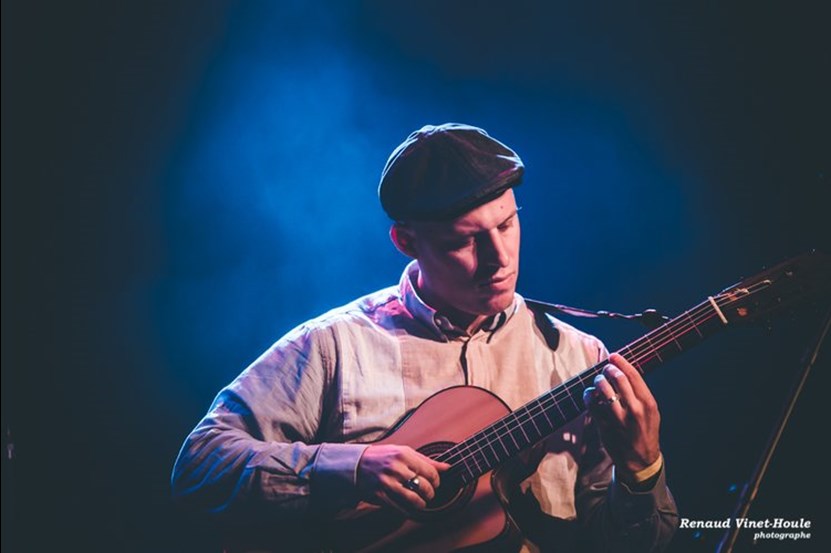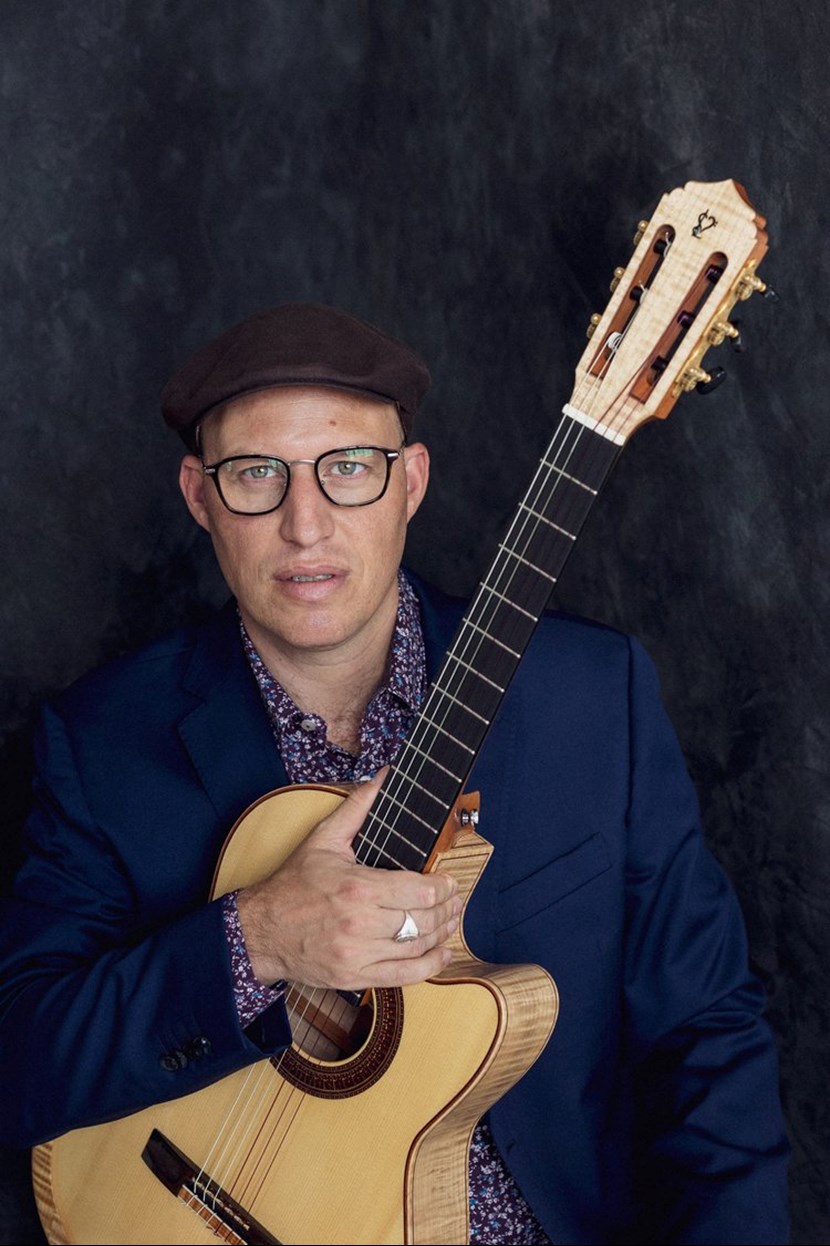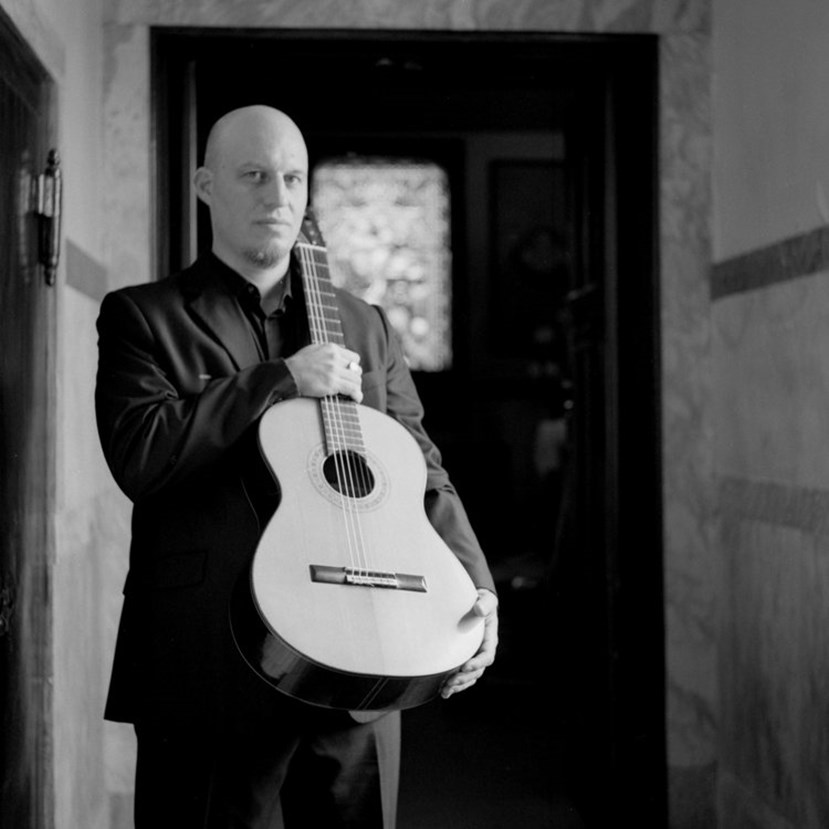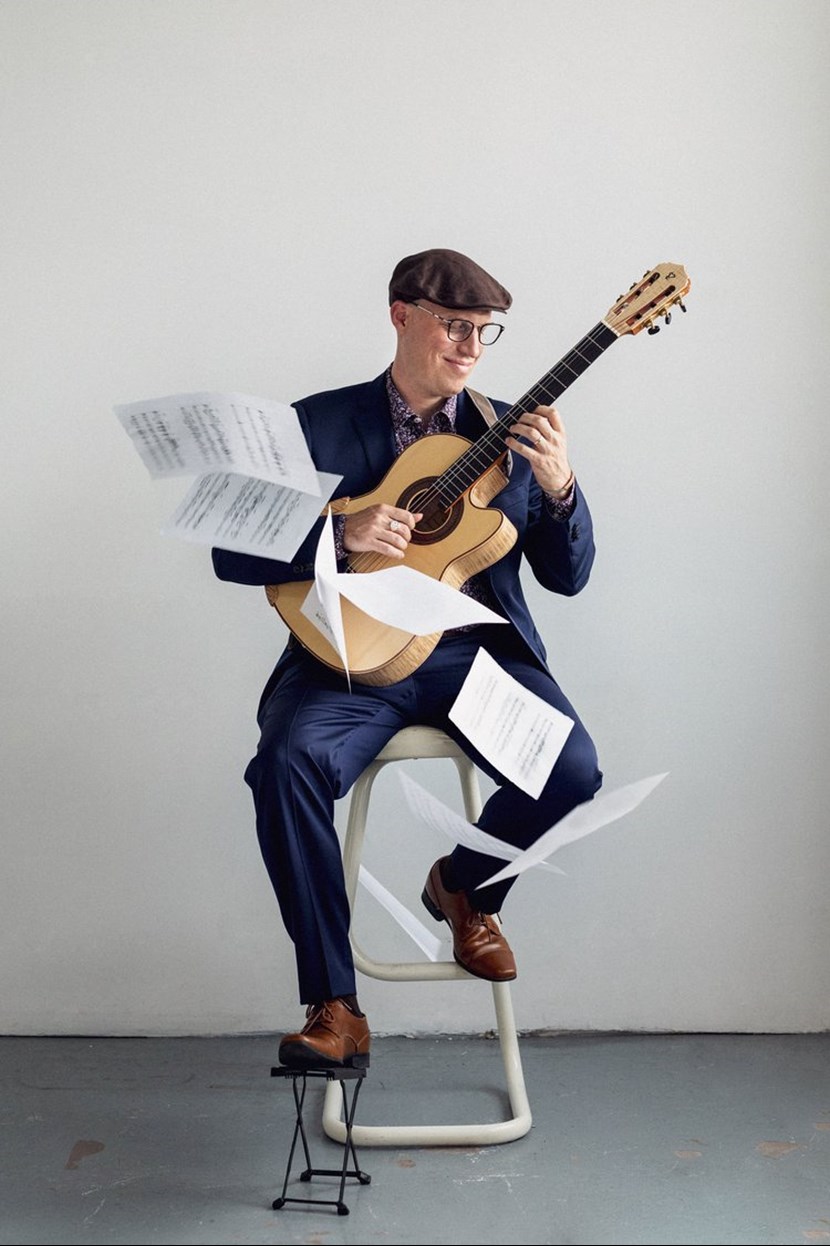Samuel Bonnet : a conversation with the guitar player from Montreal/Canada

The interview was conducted by Ferdinand Dupuis-Panther during the Jazzahead April 2023.
Why did you start to play the guitar in the first place? Have you tried out other instruments before ?
I was 8 years old when my mother asked me : "which instrument do you want to learn ?", and I said to her: „The guitar!“ I remember that my parents had this vinyl of Andrés Segovia, the most famous classical guitar player. I loved this vinyl. I think it was just in reference to this album that I said: „Guitar.“
Then my mother registered me at the local conservatory in Classical guitar. The teacher was very nice, a Spanish guy who was very much into flamenco too. My parents took me to his concert. I was totally hooked on the guitar from then on and I started lessons with him. Five years later I wanted to stop because I was quite bored of the instrument. The teacher and discipline were too rigorous. I swapped the classical guitar for Jazz guitar and found a very good teacher. I never tried out any other instruments.
How would you characterize the guitar in the context of Jazz ? Guitar players were quite well respected in Jazz thinking of Jim Hall, Joe Pass, Attila Zoller, Barney Kessel and even the great Django Reinhardt. The impact of guitar in Jazz faded as I see it...
I think the guitar was always on the side. Classical guitar is more or less banned from the traditional classical world and not part of orchestra performances. It is a kind of isolated world. That refers to Jazz as well a bit. But I think the guitar is more integrated in the „Jazz landscape“ nowadays.
Charlie Christian was one of the first guys bringing the electric guitar to the jazz world. In the beginning the guitar played only a rhythmical role. I think Christian was one of the first who was into soloing as a guitar player. Guitar (before rock came up) had always been a delicate and soft instrument, but it is also a very versatile instrument. What is most interesting is the fact that the instrument is harmonic, melodic, and rhythmical. You can play only with your fingers or with a pick, and you have to learn many skills playing as a solo performer or in a band.

© Thibault Carron
Have you ever thought about playing Pop or Rock music ?
Yes, when I was 13/14, I discovered Jimi Hendrix and wanted to play like him. Then I discovered David Gilmour (Pink Floyd) and he became my new hero. There was a time when I was into Rage Against the Machine and stuff like that. That was my so-called Rock period. Then I started to transcribe jazz and blues solos. But Pop music didn't intrigue me so much. I never wanted to play such music. Mass music was not what I wanted to be involved with.
Did I get it right that classical music was your first choice when starting to play guitar ?
It was my choice. But after a while I realized that I was not passionate. I loved the sound of the classical guitar and the technique to play classical pieces but what I really and deeply love is improvising and jazz harmony. You know when the music is on fire and intense. Classical guitar is too polished so to speak, even if I still play, admire and appreciate it.
Can you remember when you first came into contact with jazz ? Through the radio programs, going to a concert or through a specific Jazz album like „Kind of Blue“ as a kick off ?
I came into contact with Jazz very early because my father has been a real Jazz lover since he’s a teenager. He collected quite an amount of vinyl’s and attended a lot of concerts with me at a very young age. Very early, I was in contact with the music of the Jazz Messengers, the Modern Jazz Quartet, Thelonious Monk, Bill Evans, Charlie Parker, etc. as well as with the local scene in and around Paris. I can not really recall a specific album but the music of Wes Montgomery and George Benson really spoke to me. Wes was for me a game changer but I do not have a particular album in mind.
Have you ever been influenced by Django Reinhardt, Joe Pass, Jim Hall, Attila Zoller or Pat Metheny ? If yes, please tell me more about it...
I think as far as the style is concerned Jim Hall is a major influence until today. I feel connected to him. I think he was the first modern jazz guitarist. Others like Barney Kessel or even Wes were rooted in the tradition, in Bebop. Hall was very open minded and brought the modern language into Jazz. Think of his cooperations with Ron Carter, Sonny Rollins or Bill Evans. He built bridges! Of course Django, Metheny, Pass and all these guys had a huge influence on me as well.

© Boaz Berney
Could you describe the inspirations or sources for your compositions, please ?
It is very much intuition. I usually start improvising or practicing freely on the instrument. Then an idea pops up out of the blue. Usually I repeat it a lot until I'm able to record it on my phone. Then I can leave it for a few days and come back to it again and continue. When possible, I write it on Sibelius as well, because I cannot keep an idea in my mind for too long. After the process I give the piece a name. Everything is very intuitive. I cannot sit down and push myself to compose in that or this way.
Considering the projects you have set up, would you mind giving more details about the trio you play with and the duos, please ?
Just recently I started to play with a trio and released an album called „HYBRIDE“. Earlier in my career I was more involved in quartets. But I felt that now it is time for me to play in a trio. I am more confident to do it and to expose myself. I think I was playing alongside horn players because I was not very confident in my soloing. I wanted to be more in front, not being in a second row behind a saxophonist. I had to put the guitar more in focus. I like the trio format more and more and will keep it.
„Oriental Blue“ is a duo album with sax and guitar I did in 2019. It was very difficult because I was not able to improvise a lot. I had to provide the bass lines so to speak and the saxophonist was free to improvise. That was the reason why I made the decision for a trio formation, to have more freedom. „Oriental Blue“ contained my written compositions mainly. „Lev“ is a guitar and oud duo. Behind us is a three years process working with a friend of mine, the oud player Jean-Philippe Reny. He knows the tradition but is familiar with Jazz as well. I played with many oud players and sometimes they are stuck in their tradition, he is not. The cooperation of oud and guitar is a format I very much like. We took some ancient Sephardic songs as a starting material and developed a very free way to handle these songs. We just released an album called “Shesh-Besh”...
How important is the place you live to make music ?
It is quite an interesting question. I was born in Israel and moved to France with my parents when I was six. I often went to Israel as a teenager. The last ten years I was frequently touring there too. But I am mainly linked to French culture I would say. I was in Paris for 23 years of my life. To be honest I moved to Canada because I wanted to go to the USA. New York was my dream whilst in Europe. In my first three years in Canada I went there maybe ten times. You can go there on a six hours bus trip from Montreal, where I stay now. But now, I changed my mind, What I like about Montreal is that this city is a meeting point of America and Europe. It is a microcosmos. I love the atmosphere there, with French, English and people from all over the world. It is a cross cultural city. Montreal is more friendly than New York. New York is tough and hard- Montreal is a cool town. It inspires me.

© Thibault Carron
Is there a Jazz scene in Montreal ?
Great musicians and a great history of Jazz in Montreal. Most people don't know that. During a certain period of the so-called Prohibition, Montreal was a hub for Jazz, almost more than New York. There were a lot of clubs. At present there are less clubs and opportunities to play but the level of musicians is top.
I thank you for the interview.
Text © Ferdinand Dupuis-Panther - photos © Thibault Carron / Boaz Berney / Renaud Vinet-Houle
https://www.samuelbonnetguitar.com/
https://www.jazzhalo.be/reviews/cdlpk7-reviews/s/samuel-bonnet-hybride/
Other
In case you LIKE us, please click here:

Foto © Leentje Arnouts
"WAGON JAZZ"
cycle d’interviews réalisées
par Georges Tonla Briquet

our partners:



Hotel-Brasserie
Markt 2 - 8820 TORHOUT

Silvère Mansis
(10.9.1944 - 22.4.2018)
foto © Dirck Brysse

Rik Bevernage
(19.4.1954 - 6.3.2018)
foto © Stefe Jiroflée
Philippe Schoonbrood
(24.5.1957-30.5.2020)
foto © Dominique Houcmant

Claude Loxhay
(18/02/1947 – 02/11/2023)
foto © Marie Gilon

Pedro Soler
(08/06/1938 – 03/08/2024)
foto © Jacky Lepage
Special thanks to our photographers:
Petra Beckers
Ron Beenen
Annie Boedt
Klaas Boelen
Henning Bolte
Serge Braem
Cedric Craps
Luca A. d'Agostino
Christian Deblanc
Philippe De Cleen
Paul De Cloedt
Cindy De Kuyper
Koen Deleu
Ferdinand Dupuis-Panther
Anne Fishburn
Federico Garcia
Jeroen Goddemaer
Robert Hansenne
Serge Heimlich
Dominique Houcmant
Stefe Jiroflée
Herman Klaassen
Philippe Klein
Jos L. Knaepen
Tom Leentjes
Hugo Lefèvre
Jacky Lepage
Olivier Lestoquoit
Eric Malfait
Simas Martinonis
Nina Contini Melis
Anne Panther
France Paquay
Francesca Patella
Quentin Perot
Jean-Jacques Pussiau
Arnold Reyngoudt
Jean Schoubs
Willy Schuyten
Frank Tafuri
Jean-Pierre Tillaert
Tom Vanbesien
Jef Vandebroek
Geert Vandepoele
Guy Van de Poel
Cees van de Ven
Donata van de Ven
Harry van Kesteren
Geert Vanoverschelde
Roger Vantilt
Patrick Van Vlerken
Marie-Anne Ver Eecke
Karine Vergauwen
Frank Verlinden
Jan Vernieuwe
Anders Vranken
Didier Wagner
and to our writers:
Mischa Andriessen
Robin Arends
Marleen Arnouts
Werner Barth
José Bedeur
Henning Bolte
Erik Carrette
Danny De Bock
Denis Desassis
Pierre Dulieu
Ferdinand Dupuis-Panther
Federico Garcia
Paul Godderis
Stephen Godsall
Jean-Pierre Goffin
Claudy Jalet
Chris Joris
Bernard Lefèvre
Mathilde Löffler
Claude Loxhay
Ieva Pakalniškytė
Anne Panther
Etienne Payen
Quentin Perot
Jacques Prouvost
Renato Sclaunich
Yves « JB » Tassin
Herman te Loo
Eric Therer
Georges Tonla Briquet
Henri Vandenberghe
Peter Van De Vijvere
Iwein Van Malderen
Jan Van Stichel
Olivier Verhelst



